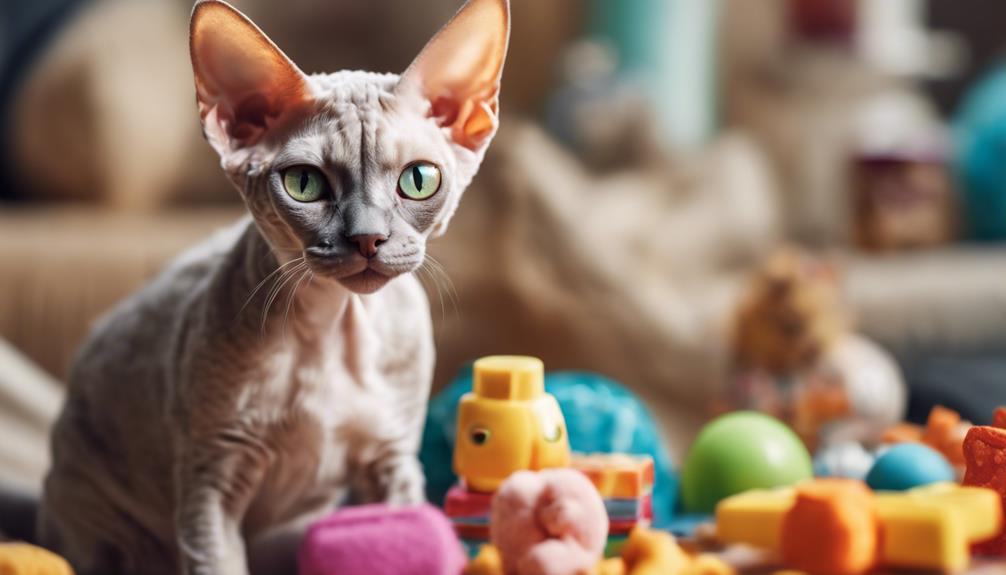When training my Devon Rex, Luna, I learned that patience and consistency are key. Understanding your cat’s unique personality and motivations can greatly impact your training success. Setting clear goals and utilizing positive reinforcement techniques are essential starting points.
However, there are more nuances to consider when working with this intelligent and energetic breed. Stay tuned to discover the remaining tips that will help you build a strong bond with your Devon Rex and achieve positive training results.
Key Takeaways
- Understand and cater to the Devon Rex’s unique traits and energetic nature for effective training.
- Consistently reinforce positive behaviors with timely rewards to build a strong bond.
- Set clear training goals, track progress, and celebrate small achievements to encourage desired behaviors.
- Seek professional guidance when needed to develop tailored training plans for the Devon Rex.
Understanding Your Devon Rex

When bringing home a Devon Rex for the first time, it’s essential to familiarize yourself with their unique characteristics and tendencies. Understanding their behavioral patterns and body language is crucial in building a strong bond.
Devon Rex cats are known for their playful and mischievous personality traits. They’re highly social cats that enjoy being the center of attention. This breed thrives on human interaction and will often follow you around the house to be a part of whatever you’re doing.
With their energetic nature and curiosity, they can sometimes get into places they shouldn’t. Being aware of their breed characteristics, such as their love for heights and warm places, can help you create a safe and stimulating environment for your Devon Rex.
Setting Clear Training Goals
To effectively train your Devon Rex, it’s crucial to establish clear and achievable training goals. Setting specific objectives will help guide your training sessions and keep you on track for success.
Here are some tips to ensure goal clarity and reach important training milestones:
- Define specific behaviors: Clearly outline what behaviors you want to teach your Devon Rex.
- Set realistic timelines: Establish achievable deadlines for reaching each training milestone.
- Break down complex tasks: Divide complicated behaviors into smaller, manageable steps.
- Track progress: Keep a training journal to monitor your Devon Rex’s development.
- Celebrate achievements: Reward your cat for successfully reaching each training goal.
Utilizing Rewards Effectively

When training a Devon Rex, proper utilization of rewards is crucial for success. Understanding reward timing and employing effective reinforcement techniques are key aspects to consider.
Reward Timing
Timing your rewards effectively is crucial in positive training for your Devon Rex, ensuring clear communication and reinforcement of desired behaviors. When training your Devon Rex, remember these key points:
- Immediate Rewards: Offer treats promptly after your cat displays the desired behavior to reinforce it effectively.
- Consistency is Key: Be consistent in rewarding good behavior to help your cat understand what you expect.
- Avoid Delay: Delayed rewards can confuse your cat, impacting behavior modification efforts.
- Precision Matters: Reward the exact behavior you want to encourage to see better training progress.
- Quality Over Quantity: Focus on the quality of rewards rather than the quantity to maintain motivation and engagement during training sessions.
Proper Reinforcement Techniques
For effective positive training of your Devon Rex, it’s essential to master the art of utilizing rewards properly. Consistent praise is key in reinforcing good behaviors. When your Devon Rex displays desired actions like using the litter box or responding to commands, be quick to offer verbal praise and a treat. This immediate positive reinforcement helps your cat understand what behavior is being rewarded.
However, it’s equally important to provide balanced corrections when needed. If your Devon Rex engages in unwanted behavior, such as scratching furniture, redirect their attention to a scratching post and gently discourage the behavior. By maintaining a balance between consistent praise and gentle corrections, you can effectively train your Devon Rex while strengthening your bond.
Consistency in Training Sessions
When training your Devon Rex, remember that consistency is key. Timing for training should be regular and clear communication is essential.
Timing for Training
Consistent training sessions play a crucial role in effectively teaching your Devon Rex positive behaviors. When it comes to timing for training, here are some key points to keep in mind:
- Training frequency: Regular short sessions are more effective than infrequent long ones.
- Reinforcement: Timely rewards reinforce good behavior effectively.
- Consistency: Stick to a routine to help your Devon Rex understand expectations.
- Timing: Choose times when your cat is alert and receptive, avoiding sleepy or overly active periods.
- Patience: Stay patient and understanding during training sessions; every cat learns at their own pace.
Clear Communication
To effectively communicate with your Devon Rex during training sessions, maintaining consistency in your approach is key to their understanding and progress. Consistent body language and vocal cues help your cat comprehend your expectations and reinforce positive behaviors. Your body language should be calm and assertive, showing confidence in your commands. Use clear, simple vocal cues such as “sit” or “good job” to associate words with actions. By being consistent in both your body language and vocal cues, you create a structured environment that aids in your Devon Rex’s learning process. Remember, cats are observant creatures, and they respond well to clear communication signals. Here’s a handy table to illustrate the importance of consistency:
| Consistency in Communication | |
|---|---|
| Helps cat understand expectations | Reinforces positive behaviors |
| Calm and assertive body language | Clear and simple vocal cues |
Patience and Positive Attitude

With a positive attitude and a generous dose of patience, training your Devon Rex can be a rewarding experience for both you and your furry companion. Building trust and fostering confidence are key elements in this process. Here are some tips to help you along the way:
- Stay Calm: Remaining calm in challenging situations will help your Devon Rex feel secure.
- Celebrate Small Wins: Acknowledge and reward even the smallest progress to keep motivation high.
- Set Realistic Goals: Be patient and understand that learning takes time; set achievable goals.
- Use Positive Reinforcement: Encouragement and rewards will reinforce good behavior effectively.
- Take Breaks: If either of you gets frustrated, take a break to regroup and come back with a fresh mindset.
Socialization Strategies for Success
When embarking on socialization strategies for your Devon Rex, it’s crucial to introduce gradual exposure to various environments and experiences to foster a well-rounded and confident feline companion.
Start by incorporating playful interactions and bonding activities in your daily routine. Engage your Devon Rex in interactive play sessions and gentle handling to build trust and strengthen your bond.
Additionally, ensure positive socialization by exposing your cat to new environments in a calm and controlled manner. Introduce them to different sounds, smells, and people gradually, rewarding them for calm behavior.
Monitoring Progress and Adjusting Techniques

As we continue the positive training journey with your Devon Rex, it’s essential to closely monitor their progress and be ready to adjust techniques accordingly for their development. Tracking progress allows us to tailor our approach to suit your cat’s individual needs effectively.
Here are some practical tips for monitoring progress and modifying techniques:
- Regular Check-ins: Schedule time to assess how your Devon Rex is responding to training.
- Observe Body Language: Pay attention to subtle cues that indicate if your cat is comfortable or stressed.
- Celebrate Small Wins: Acknowledge and reward incremental improvements to reinforce positive behavior.
- Seek Professional Guidance: Don’t hesitate to consult a trainer for specialized advice.
- Stay Patient and Consistent: Rome wasn’t built in a day, and neither is perfect training.




